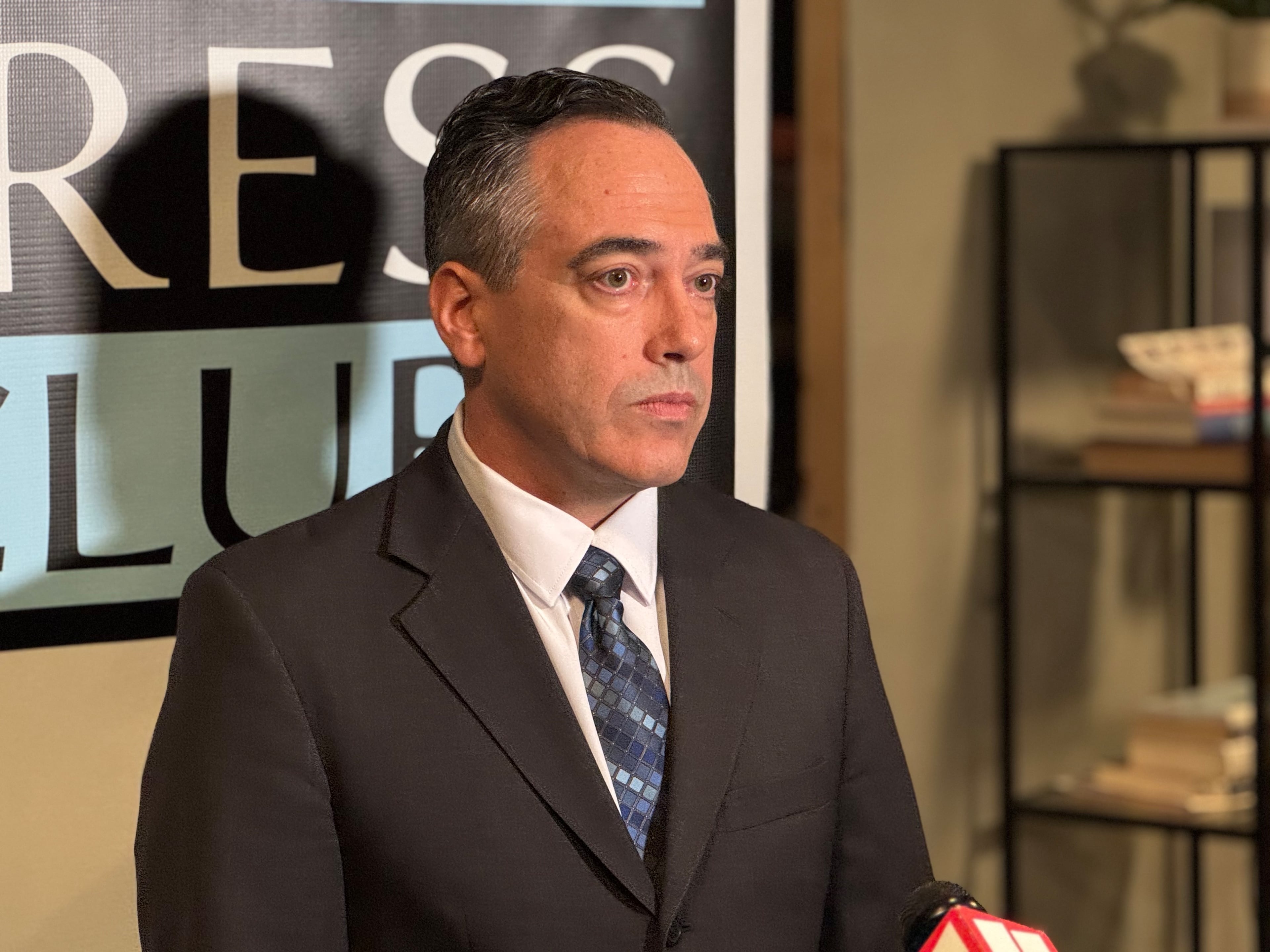Georgia Republicans are on edge as Democrats target 2 PSC seats

The lakeside pavilion in deep-red Forsyth County rang with the familiar GOP rallying cries of the past few blockbuster political campaigns: The Democrats are woke, socialist and dead set on importing California’s liberal policies to Georgia.
But this wasn’t a rally for next year’s governor or Senate race. Republicans were leaning hard into the red-meat playbook to defend two little-known Public Service Commission members they’re terrified could lose next month.
Interviews with more than a dozen senior GOP leaders revealed deep anxiety that Democrats could flip both seats in the Nov. 4 vote, scoring an upset that would jolt Georgia politics ahead of the 2026 midterms.
“If we don’t put a stake in the ground in November, there’s going to be blood in the water,” said Republican state Sen. Larry Walker, one of the chamber’s leaders. “The Democrats are going to be emboldened — and they’re going to spend ungodly amounts of money next year.”
That fear is not hyperbole.
The Public Service Commission regulates Georgia Power and other utilities, the kind of low-profile post that rarely draws voter attention. The elections are statewide, yet typically overshadowed by marquee contests for governor or Congress. And even if Democrats sweep both, Republicans would still control the five-member panel.

But Republicans say Democratic wins could have broader implications, signaling that the GOP’s long grip on statewide offices is loosening. While Democrats Jon Ossoff and Raphael Warnock both won U.S. Senate elections in 2021 and Warnock won again in 2022, it’s been nearly two decades since a Democrat has won a race for any other statewide office.
That last came in 2006, when Attorney General Thurbert Baker, Agriculture Commissioner Tommy Irvin and Labor Commissioner Michael Thurmond still held office. That same year, Democrat David Burgess lost his PSC seat, handing the GOP complete control of the powerful regulatory body for the first time.
Now, that GOP streak is being tested.
Warning signs
The dual PSC races, forced by court rulings, pit GOP incumbents Tim Echols and Fitz Johnson against Democrats Alicia Johnson and Peter Hubbard.
Republicans see warnings signs everywhere. Bills for Georgia Power residential customers have climbed roughly $43 a month since early 2023 after six commission-approved increases, and some Georgians are venting their frustrations.
It’s an off-year election with a Republican in the White House, a combination that typically drags down the party in power. Major municipal races in Atlanta and other Democratic strongholds could further tilt left-leaning turnout.

And the surge of new GOP voters who turned out for President Donald Trump’s comeback victory last year may not show up for races about utility regulation, said GOP strategist Brian Robinson.
“If Democrats win, the results would reverberate strongly into the 2026 election where all the state’s biggest prizes are on the line,” he said.
Democrats, meanwhile, are treating the races as both a policy fight and an organizing test. Their candidates have attacked the commission’s record on clean energy and rising costs.
“I’ve got one question for you: Are your power bills too high?” Johnson said at a recent Democratic rally, as the crowd roared in agreement. “Well, all across Georgia families are dealing with the same problem.”
Turnout fight
Turnout for PSC races is normally steady because they coincide with presidential votes or midterms.
But elections for the PSC were delayed in 2022 because of a court battle over whether the statewide voting for the seats illegally diluted the influence of Black Georgians.
That makes turnout the biggest wild card this November. Only 2.5% of the state’s 8.4 million registered voters cast ballots in the June PSC primary. During the runoff the next month, poll workers outnumbered voters in some rural counties.
“About a year ago, we elected Trump with a 115,000-vote margin,” said Georgia GOP chair Josh McKoon. “We hardly had 115,000 votes total in the Republican primary for this race.”

Even as nervous Republicans acknowledge internal polling shows the race is tight, some point to the last PSC election for reassurance. During the 2021 Senate runoffs — when Ossoff and Warnock flipped Georgia’s U.S. Senate seats — Republican Bubba McDonald still narrowly held his PSC post.
The GOP incumbents aren’t taking chances.
Georgia Power recently struck a deal with the commission to freeze rates through 2028, sparing Echols and Johnson from new hikes during their campaigns. Still, analysts say rates could rise again next year as the utility seeks to recoup storm-related costs from recent disasters.
And Gov. Brian Kemp may have given his party another assist. He scheduled a special election to replace outgoing Democratic state Sen. Jason Esteves for two weeks after the PSC vote, denying Democrats a potential turnout boost.
Cobb County’s election board said the decision would bring “increased cost and wasted resources,” but Kemp fired back that it would give voters more time to evaluate the lineup of candidates running for the left-leaning seat.
‘California our Georgia’
While Republican worry, Democrats are hammering pocketbook issues and steering clear of combative culture wars fights.
Andrew Heaton, a consultant for Alicia Johnson’s campaign, said the strategy is straightforward: Even if voters don’t grasp every detail of the commission’s work, they understand when their bills go up.

The party rolled out an aggressive mobilizing push as the Oct. 14 start of early voting nears, with county leaders hosting neighborhood canvasses, twice-weekly phone banks and door-to-door routes highlighting rate hikes while promoting both Democratic challengers.
“Georgians know their power bills are too damn high — and Georgia Democrats are organizing across the state to make sure they know exactly who’s to blame: Republicans on the Public Service Commission,” said state party chair Charlie Bailey.
At this week’s rally in Forsyth County, Republicans struck a far different tone.
U.S. Rep. Mike Collins, now running for Senate, warned that Democratic victories could open the door to a “Green New Deal” agenda. Attorney General Chris Carr, a GOP contender for governor, said electing the “two socialists” would give Democrats a leg up in 2026.
The incumbents got in on the act, too. Fitz Johnson accused Hubbard of trying to “California our Georgia.” Echols said Alicia Johnson would bring “DEI and wokeness” to the commission because of her background as a nonprofit executive, leading the Democrat to fire back and accuse him of “MAGA dog whistle” tactics.
One of the bluntest warnings, though, came from Kemp, who said voter apathy could play into Democratic hands.
“They don’t even want people to know that there’s a race, and that is our biggest liability,” he said. “People just don’t know what’s going on. And the Democrats want it to stay that way.”




